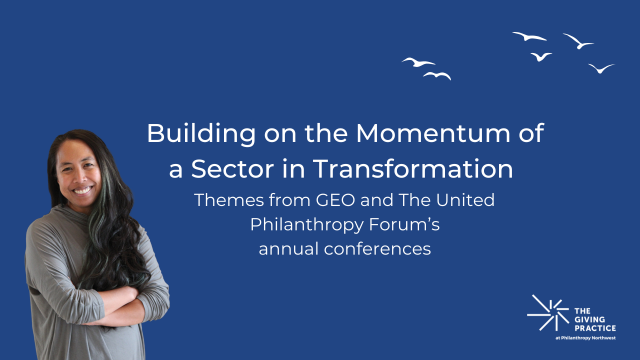As the demographics of our communities shift and evolve, we see growing interest from philanthropy leaders in adopting multicultural approaches so that we can benefit from our differences, rather than assuming people will assimilate into an institutional set of norms, values and customs.
To promote, facilitate and drive collaborative action, we must have the courage to unpack how we've been socialized to think about one another and the willingness to recognize institutional advantages and disadvantages people face. Twenty senior executives from Seattle-area foundations came to Philanthropy Northwest this week for a half-day workshop on "Culturally Competent Leadership in the 21st Century," co-hosted by Pangea Giving. Facilitated by Ilsa Govan of Cultures Connecting, co-author of Diversity, Equity, and Inclusion: Strategies for Facilitating Conversations on Race, participants explored the ways our personal biases and assumptions contribute to systemic oppression.
Participants sought a framework for how to address issues of equity and race, to gain a deeper understanding of the role cultural competence and self-awareness plays in fostering trusting, transparent and respectful relationships with grantees. The conversations — some talking in pairs and small groups, including story-telling and multimedia exercises — covered the distinctions of equity vs. equality, creating deeper self-awareness and a common language for discourse, and how these themes could be applied at philanthropy organizations.
Govan presented four pillars of cultural competence, based on a shared foundation of social justice and culminating in dignity, equality, equity and respect:
- Awareness: How do I contribute to injustice; change in self.
- Knowledge: What do I need to understand about others?
- Skills: What can I do differently to honor differences?
- Action/Advocacy: What do we need to do to institutionalize change? Anti "ism" work that leads to organizational change in practice/policy.
"I wanted people to learn not just more about the issues themselves, but how to engage in an ongoing way about the issues," she said, in an interview after the workshop.
"This workshop was an important first step towards deepening my own awareness of my unconscious incompetence — to steal a phrase from Ilsa," said Kristen Holway, Philanthropy Northwest director of learning strategy. "There are so many ingrained habits — and faulty assumptions about power and equity — that I am just beginning to recognize in myself. Luckily this was the first workshop in a series."
Our next workshop with Pangea Giving, "Cultural Competence within the Context of Donor-Grantee Relationships," will be announced this spring. Members will be invited to continue to explore strategies for deepening awareness of self — moving from color blindness to racial cognizance; increasing knowledge of others and their experiences of racism and oppression; developing skills to work effectively across cultures; and advocating and taking action to initiate change. Contact Kristen Holway, director of learning strategy, for more information.
Nicole Neroulias Gupte is communications manager at Philanthropy Northwest. Contact her at ngupte@philanthropynw.org.


